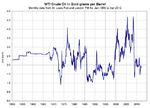L
Liquid validity
Agreed, at best the decline in oil production can be slowed down by new
survey and extraction technology. That still comes at a cost - extraction and field
development are more expensive, adding to upwards pressure on oil price.
As for alternatives, until recently I always thought the progression to
electric vehicles was a massive mistake.
For me the hydrogen fuel cell seemed more practical and realistic:
Honda Worldwide | Fuel Cell
BBC NEWS | Business | Honda makes first hydrogen cars
Obviously the dowside is perception,
the hindenburg being an obvious example despite technological advances.
That was until I came across a solar power variant:
Victorville Solar Power Generating Station, California - Power Technology
Solar mirror - Wikipedia, the free encyclopedia
Seems to be gathering pace and is on track to be the worlds largest
solar power experimental project.
Rolled out on a mass scale, that would answer the argument of fossil fuel
power stations generating electricity to charge electric vehicles.
With electric vehicles, the practicalities of recharging could be overcome by
adopting a universally agreed battery format.
That would allow a quick battery cahnge at a battery centre or even
as an additional service provided by petrol stations in the interim.
Personally, I think alternative energy plans have been in place for quite some time.
Its just the vested interests making sure every last drop is milked from
the oil cashcow before it keels over.
survey and extraction technology. That still comes at a cost - extraction and field
development are more expensive, adding to upwards pressure on oil price.
As for alternatives, until recently I always thought the progression to
electric vehicles was a massive mistake.
For me the hydrogen fuel cell seemed more practical and realistic:
Honda Worldwide | Fuel Cell
BBC NEWS | Business | Honda makes first hydrogen cars
Obviously the dowside is perception,
the hindenburg being an obvious example despite technological advances.
That was until I came across a solar power variant:
Victorville Solar Power Generating Station, California - Power Technology
Solar mirror - Wikipedia, the free encyclopedia
Seems to be gathering pace and is on track to be the worlds largest
solar power experimental project.
Rolled out on a mass scale, that would answer the argument of fossil fuel
power stations generating electricity to charge electric vehicles.
With electric vehicles, the practicalities of recharging could be overcome by
adopting a universally agreed battery format.
That would allow a quick battery cahnge at a battery centre or even
as an additional service provided by petrol stations in the interim.
Personally, I think alternative energy plans have been in place for quite some time.
Its just the vested interests making sure every last drop is milked from
the oil cashcow before it keels over.


